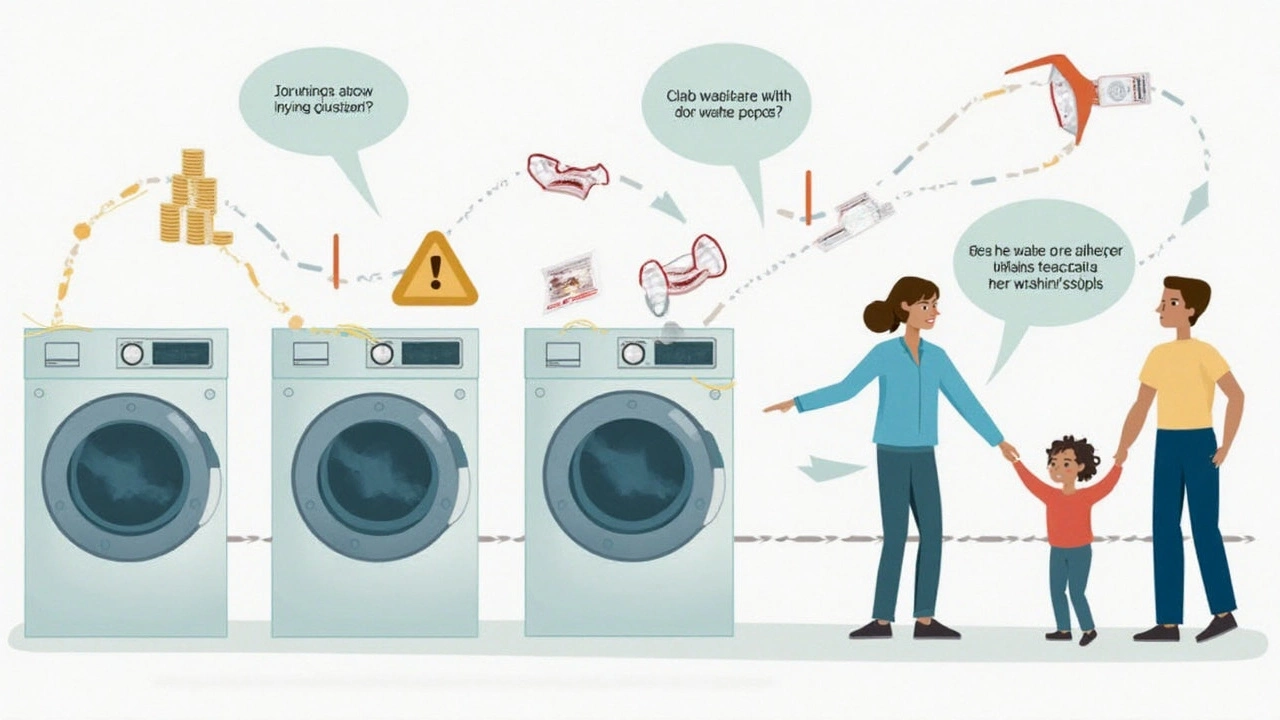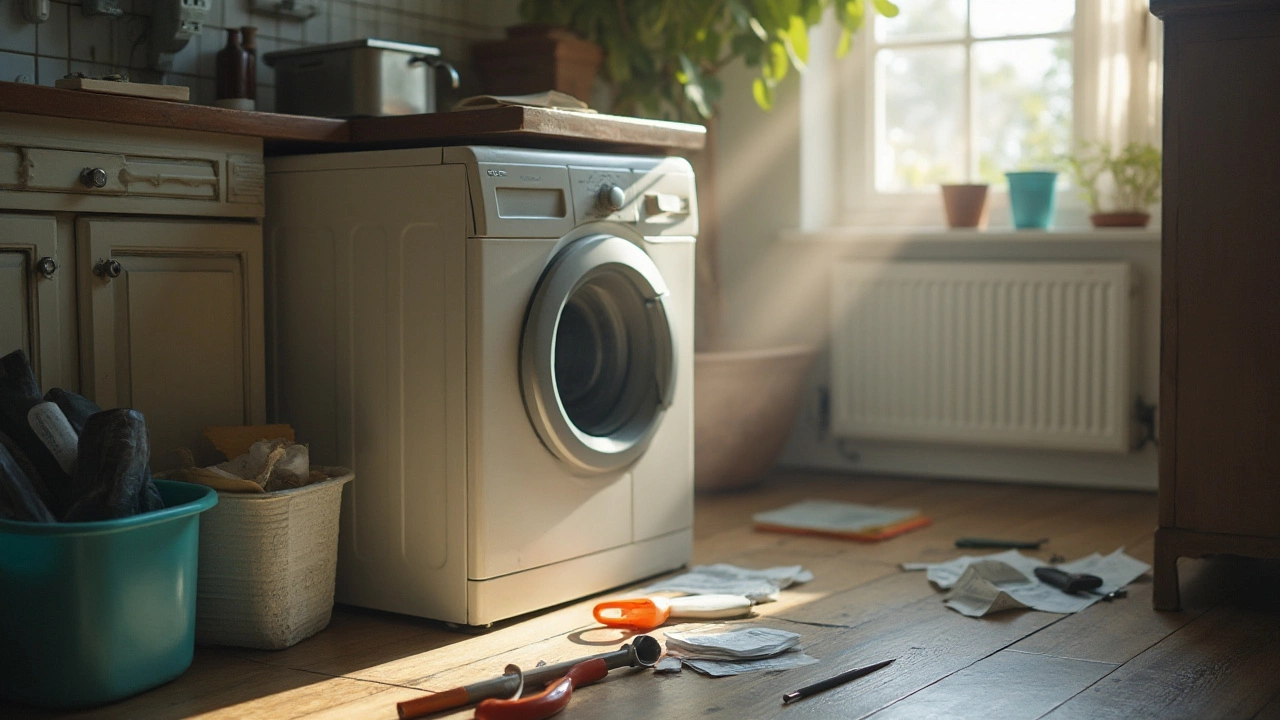
- 21 May 2025
- Gideon Thornton
- 0
Most people think a washing machine should keep going for at least a decade. But the real answer is, it depends a lot—on the brand, how often you use it, and how you treat it. On average, a good washing machine hangs in there for about 8 to 12 years. Some bite the dust sooner, while a few keep spinning away at 15 years or more.
It’s easy to forget that washers have a breaking point, until your favorite shirt is stuck soaking and soapy at the worst time. That average lifespan isn’t set in stone—if you’re tossing in giant loads every day or living in a place with hard water, you might see trouble earlier. But with the right care and a little attention, you can squeeze more years (and clean clothes) out of your machine.
- The Real Lifespan of a Washing Machine
- What Makes a Washer Last Longer
- Common Reasons Washers Break Down Early
- Warning Signs You Shouldn't Ignore
- Should You Repair or Replace?
- Top Tips to Boost Your Washing Machine's Lifespan
The Real Lifespan of a Washing Machine
If you ask people how long a washing machine lasts, you’ll hear everything from “it died after five years” to “my grandma’s still works after 20.” In reality, the average lifespan lands somewhere in the middle. For most households, you can expect a solid 8 to 12 years from your machine before big problems show up.
Here’s the thing—those numbers aren’t just guesses. Consumer Reports and appliance groups have actually tracked washing machine lifespans. Most front-load washers make it to about 10 years, while top-loaders often tap out a little sooner at 8 to 10 years. If you run a few loads a week, you’ll probably get the full distance. Four or more loads a day? That wears parts out fast.
Check out this quick chart based on manufacturer reports and what repair techs see all the time:
| Type of Washer | Average Lifespan (Years) |
|---|---|
| Front-Load | 10 |
| Top-Load (Agitator) | 8 |
| Top-Load (Impeller/High-Efficiency) | 10-12 |
| Compact/Portable | 5-8 |
Even with these averages, you’ll see big swings based on usage and care. One big factor: repairs. If you skip regular maintenance, or ignore small issues, you’ll likely see your machine break down way before its time.
Here’s the kicker. The washing machine lifespan keeps changing as new tech comes out. Older models from the 80s and 90s often outlasted what’s sold today. These days, machines are packed with sensors and fancy options, so there’s more that can go wrong.
If hitting the 10-year mark matters to you, regular check-ups, careful loads, and quick fixes go a long way. But if you’re seeing leaks, loud rattles, or the spin cycle just gives up, you might be nearing the end—even if the years don’t quite add up yet.
What Makes a Washer Last Longer
If you want your washing machine to reach the top end of its average lifespan, or even outlive it, you need to pay attention to how you use and care for it. Small habits often make the difference between a washer that quits at year 7 and one that’s still chugging along at year 12.
First, avoid stuffing the drum to the brim. Overloading makes the motor and bearings work overtime, which almost always leads to more repairs down the road. A good rule: fill it about three-quarters full and leave some space for clothes to move.
Too many skipped cleanings? That’s a silent killer for washers. Most modern models benefit from a basic cleaning every 30 cycles or once a month. Grab some white vinegar, run a hot empty cycle, and wipe down the seals. This knocks out mold, detergent buildup, and funky smells.
- Keep the washer level. Unbalanced machines vibrate, wear out fast, and can even damage floors.
- Use the right kind of detergent—especially for high-efficiency (HE) washers. Regular soap suds up too much and can wreck the inner parts.
- Empty pockets carefully. Coins, keys, and hairpins are notorious for ruining the pump or jamming the drain.
- After each wash, leave the door open for a bit so the inside dries out. This helps with mold and mildew, especially for front-loaders.
It’s worth checking your water hardness, too. Hard water makes mineral deposits build up in hoses and valves, which strains the whole system. You can get test kits at hardware stores. If your water is hard, running an empty load with store-bought descaler every few months really helps.
| Washing Machine Care Habit | Extra Years Added (Approx.) |
|---|---|
| Regular cleaning & filter checks | 2-3 years |
| Avoiding overloads | 1-2 years |
| Using correct detergent | Up to 1 year |
| Maintaining hoses (replace every 5 years) | Prevents sudden failures |
| Keeping washer level | 1 year |
Here’s what it really comes down to: if you treat your washer like an investment—rather than something to just slam shut and forget—you’ll get way more clean loads and fewer panic repair calls. If you remember nothing else, just treat it gently and keep it clean. That alone can stretch your washing machine lifespan way past the average.
Common Reasons Washers Break Down Early
Washers aren’t immortal—they mostly break down from the same handful of issues. If you know what knocks them out, you can dodge expensive repairs or an early trip to the appliance store. Here are the biggest culprits:
- Overloading: It’s tempting to stuff the drum to save time, but jamming in heavy loads stresses the motor and belts. This makes breakdowns way more likely, especially in machines used by big families or in busy households.
- Neglecting Maintenance: Skipping little things like cleaning the filter, wiping the door seal, or leaving wet clothes in too long lets mold, gunk, and small objects mess with the machine’s insides. That gunk can mess up draining and sensors fast.
- Hard Water Build-Up: If you have hard water, mineral deposits build up on heating elements and pipes. That makes the machine work harder and fail early. You’ll spot this as white, chalky residue or mysterious odors.
- Poor Installation: If a washer isn’t level or connected right, it vibrates more and shakes itself apart over time. Sloppy installation is actually a pretty common reason for early repairs.
- Ignoring Early Warning Signs: Small annoyances like strange noises, leaks, or longer cycles? People often ignore them, but these are usually the first signs something major is about to break.
Want to see how often these problems actually knock out a washer? Here’s what techs see most:
| Cause | Percent of Washer Breakdowns |
|---|---|
| Overloading/Misuse | 30% |
| Hard Water Damage | 22% |
| Neglected Maintenance | 18% |
| Poor Installation | 15% |
| Normal Wear & Tear | 15% |
If you want to make your washing machine lifespan as long as possible, dodge these issues before they ruin your washer. One ignored rattle, leak, or overloaded wash can quickly grow into a costly breakdown.

Warning Signs You Shouldn't Ignore
A washing machine rarely croaks out of nowhere. Usually, it tries to tell you something's off. Catching early problems can save you a pricey repair or a last-minute hunt for quarters at the laundromat.
If you notice any of these problems, don’t shrug them off:
- Washing machine lifespan takes a big hit if your washer is leaking water. Sure, a drip might just be a loose hose, but a steady leak can lead to big repairs or rot the floor under your machine.
- Loud banging, grinding, or screeching noises mean trouble inside. You might have a loose drum, broken shock absorbers, or something stuck where it shouldn’t be. The longer you run it, the bigger the repair bill.
- Unusual vibrations or the washer "walking" across the room? That usually points to balance problems, suspension issues, or a worn-out shock absorber. If the drum wobbles when you push it by hand, that’s a big red flag.
- Funky smells that stick around even after running a cleaning cycle? Mold and bacteria build up fast in damp spots. Left alone, you’ll get bad odors, dirty clothes, and maybe even ruined gaskets.
- The door or lid not locking? Modern washers quit if they think the door’s open. This could be a busted latch or a faulty sensor. Either way, your machine won’t run—or it could stop mid-cycle and lock your clothes inside.
- Your clothes come out still dirty, way too wet, or with detergent caked on them? If you’re following directions and still have bad results, the machine isn’t washing or spinning right. Parts like the pump, drum, or motor could be on their way out.
- Random shutdowns or electronic glitches can be a sign the control board is failing, which can cost as much as a new entry-level washer to fix.
Avoid waiting until total breakdown. If you spot any of these signs, get a pro to check your washer or dig into a repair tutorial. Fixing a small issue now is way cheaper than buying a new machine way ahead of schedule.
Should You Repair or Replace?
This is the million-dollar question—literally, if you keep calling the repair guy every six months. The biggest thing to consider is the age of your machine. If yours is pushing past the 10-year mark, most repair pros will tell you you’re living on borrowed time. Statistically, washers over 8 years old are more likely to develop problems, especially if you’ve already fixed something big, like the motor or transmission.
Here’s a quick rule: if fixing it costs more than half the price of a new model, it’s usually not worth it. That’s not just opinion—Consumer Reports tested repair costs over thousands of calls and found this 50% rule really works out for most brands. Also, if you’re facing repeated repairs in a short span, that’s a big red flag. It’s a sign the main components are starting to go.
But don’t jump to replace it for every little thing. Small fixes like a busted hose, a torn belt, or a broken lid switch are easy and cheap. These repairs often run under $150 if you bring in a pro (even less if you’re handy).
- Is your washer still under warranty? Repairs are a no-brainer—use that coverage before paying out of pocket.
- Have you noticed rust, leaking tubs, or major electrical issues? These almost always mean your machine’s on its last legs.
- Are parts for your washer easy to find? Some older models (especially top-load ones from the 2000s) have cheap, available parts, making repairs easier.
Newer washers are more energy-efficient and use less water, so sometimes saving on monthly bills is worth the upfront cost. If your old machine is loud, shaky, or stops mid-cycle often, you’re probably due for an upgrade to a more reliable, washing machine lifespan friendly model.
Top Tips to Boost Your Washing Machine's Lifespan
If you want your washing machine to keep running strong for years, a few smart moves can make a big difference. Here’s what really works when people ask how to get the most out of their washers:
- Don't Overload It. Packing the drum too tight stresses the motor and bearing, leading to quick breakdowns. Stick to the recommended load size from your manual—don’t just jam it full because you’re in a hurry.
- Keep it Clean. Once a month, run a hot, empty cycle with washing machine cleaner or a mix of white vinegar and baking soda. This helps cut down on gunk, mold, and weird smells, especially in front-loaders.
- Check the Hoses. Each year, look at the hoses for bulges, cracks, or leaks. Replace them every five years. One busted hose can flood your laundry room and wreck your machine’s electronics.
- Level It Out. A wobbly machine can shake itself apart over time. Check the legs and use a level to steady things if needed.
- Leave the Door Open. Front-loaders need airflow to prevent mildew and musty smells. Even top-loaders benefit from a little air.
- Use the Right Detergent. High-efficiency (HE) machines need HE detergent. Using regular soap causes extra suds, gum up sensors, and even lead to expensive repairs.
Taking just a bit of time for these steps can help you hit—and sometimes beat—the average washing machine lifespan. Compared to the cost of a new washer or an emergency repair call, it’s worth the effort.
| Task | When to Do It |
|---|---|
| Wipe door gasket (front-loaders) | After every wash |
| Empty and clean lint traps (top-loaders) | Every load |
| Run a cleaning cycle | Once a month |
| Inspect hoses | Every year |
| Replace hoses | Every 5 years |
| Level the washer | Check yearly or if noisy |
Even just following half of these tips can turn a so-so washer into a long-lasting workhorse.




